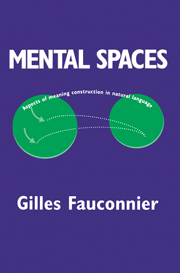Book contents
- Frontmatter
- Contents
- Foreword
- Preface
- Acknowledgments
- Introductory Note
- 1 Pragmatic Functions and Images
- 2 Roles and Multiple Connectors
- 3 Presuppositions: Floating, Transfer, and Projection Strategies
- 4 Counterfactuals and Comparatives
- Chapter 5 Transspatial Operators, Philosophical Issues, and Future Perspectives
- Notes
- References
- Index
Preface
Published online by Cambridge University Press: 20 January 2010
- Frontmatter
- Contents
- Foreword
- Preface
- Acknowledgments
- Introductory Note
- 1 Pragmatic Functions and Images
- 2 Roles and Multiple Connectors
- 3 Presuppositions: Floating, Transfer, and Projection Strategies
- 4 Counterfactuals and Comparatives
- Chapter 5 Transspatial Operators, Philosophical Issues, and Future Perspectives
- Notes
- References
- Index
Summary
Backstage Cognition
When language, mind, and culture are the object of scientific study, the investigator is no longer a mere spectator. He or she is one of the actors, part of the phenomenon under study: The thinking and talking that need to be demystified are also the thinking and talking used to carry out the demystification. The investigation that will reveal backstage secrets is also part of the main show, and clearly we are on intellectually perilous ground.
The promising development of cognitive semantics in the last fifteen years has given us wonderful insights into some of the backstage organization of language and thought. But such insights do not come easily. Many traditional, respected, well established ways of viewing and interpreting empirical phenomena need to be reassessed, questioned, or abandoned. Commonsense views that have been worked into scientific theories may constitute a misleading context for scientific communication.
Cognitive science is beginning to flourish. Powerful new computational techniques are available. Neurobiology is destined to play an important role. Sophisticated accounts have been developed for mental representations, the nature of consciousness, and the mysteries of learning and cognitive development. Language plays an important role in much of this work, either as a direct object of study or as an indirect implicit means of accessing other information. Yet, too often, the sophistication of the techniques and experimental procedures is not matched by a corresponding awareness of the hidden, counterintuitive complexities of cognitive construction linked to language. The commonsense, folktheoretic picture of speech, thought, and communication is easy to import uncritically into general cognitive science research.
- Type
- Chapter
- Information
- Mental SpacesAspects of Meaning Construction in Natural Language, pp. xvii - xlviPublisher: Cambridge University PressPrint publication year: 1994

